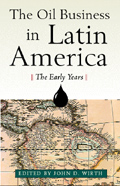|
|
|
|
||||||

|
The Oil Business in Latin America: The Early Years
By John D. Wirth, Ed. 2001/12 - Beard Books 1587981033 - Paperback - Reprint - 322 pp. US$34.95 This revealing book shows how a state enterprise in Latin America is clothed in legitimacy and empowered with a breadth of functions Publisher Comments
This well-documented book covers five case studies designed to gain an insight into the unique Latin American approach to petroleum resources and industries. Included are Standard Oil of New Jersey, and the nationalized companies in Argentina, Brazil, Mexico, and Venezuela. Each essay on origins covers an assessment of the conditions existing for each company at the time the essay was written as an examination of the critical formative years. A final essay provides a public policy perspective of state companies. It analyzes the public enterprise as a type of organization that is institutionally distinct from general government and that has particular institutional needs.
>From Turnarounds and Workouts, February 15, 2002 This book grew out of a 1981 meeting of the American Historical Society. It highlights the origin and evolution of the state-owned petroleum companies in Argentina, Mexico, Brazil, and Venezuela. Argentina was the first country ever to nationalize its petroleum industry,
and soon it was the norm worldwide, with the notable exception of the United
States. John Wirth calls this phenomenon "perhaps in our century the oldest
and most celebrated of confrontations between powerful private entities and the
state."
The authors assess the conditions at the time they were writing, and relate them back to the critical formative years for each of the companies under review. They also examine the four interconnecting roles of a state-run oil industry and distinguish them from those of a private company. First, is the entrepreneurial role of control, management, and exploitation of a nation's oil resources. Second, is production for the private industrial sector at attractive prices. Third, is the integration of plans for military, financial, and development programs into the overall industrial policy planning process. Finally, in some countries is the promotion of social development by subsidizing energy for consumers and by promoting the government's ideas of social and labor policy and labor relations. The author's approach is "conceptual and policy oriented rather than narrative," but they provide a fascinating look at the politics and development of the region. Mr. Brown provides a concise history of the early years of the Standard Oil group and the effects of its 1911 dissolution on its Latin American operations, as well as power struggles with competitors and governments that eventually nationalized most of its activities. Mr. Solberg covers the many years of internal conflict over oil policy in Argentina and YPF's lack of monopoly control over all sectors of the oil industry. Mr. Wirth describes the politics and individuals behind the privatization of Brazil's oil industry leading to the creation of Petrobras in 1953. Mr. Duran notes the wrangling between provinces and central government in the evolution of Pemex, and in other Latin American countries. Mr. Lieuwin discusses the mixed blessing that oil has proven for Venezuela., creating a lopsided economy dependent on the ups and downs of international markets. Mr. Saunders concludes that many of the then-current problems of the state oil companies were rooted in their early and checkered histories." Indeed, he says, "the problems of the past have endured not because the public petroleum companies behaved like the public enterprises they are; they have endured because governments, as public owners, have abdicated their responsibilities to the companies." From BookNews Essays in this book present five case studies that offer insight into the Latin American approach to petroleum resources and industries, focusing on Standard Oil of New Jersey and the four nationalized oil companies in Argentina, Brazil, Mexico, and Venezuela. Essays on each company examine company origins, and a final essay provides a public policy perspective of state companies, analyzing the public enterprise as a type of organization that is institutionally distinct from general government. An appendix offers petroleum statistics for the four Latin American countries, 1910-1980. Wirth teaches history at Stanford University. Annotation c. Book News, Inc., Portland, OR (booknews.com)
|
|
|
|
home
| about
us | contact
us | related
sites |